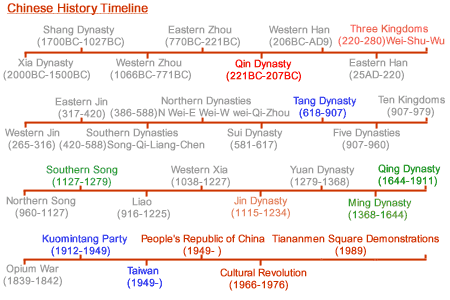
Overview
Man in China passed from primitive society to
slave society with the founding of the first
dynasty, Xia and continuing through the following dynasties.
The slave era was followed by the Spring and
Autumn and Warring States periods, which started the transition to a feudal
society. This period had thriving philosophy with representatives of various
schools vying with each other in writing books to discuss politics and analyze
society. Famous philosophers in this period included Lao Zi, Confucius, Mo
Zi and Sun Zi.
The first emperor was Shi Huang Di (Ying
Zheng) of the Qin Dynasty (221-207 BC), who standardized the script, currencies,
weights and measures, and established a system of prefectures and
counties. He constructed the Great Wall in addition to a large palace,
mausoleum and regal lodges in several locations around China. The terra
cotta armies (found underground) are known to be the eight wonder of the
world.
Back
to Top...
 In 1206, Genghis Khan unified all the tribes
in Mongolia and founded the Mongol Khanate. In 1271, his grandson Kublai
Khan, conquered the Central Plain, founded the Yuan Dyanasty (1271-1368) and
made Dadu (Beijing) the capital. Many merchants came from abroad and the
handicraft industry along with domestic and foreign trade boomed. Marco
Polo came from Venice and traveled extensively in China and later described his
travels the country's prosperity. The "four great inventions" of
the Chinese people were further developed during this and the Song era (paper
making, printing, the compass and gun powder). In 1206, Genghis Khan unified all the tribes
in Mongolia and founded the Mongol Khanate. In 1271, his grandson Kublai
Khan, conquered the Central Plain, founded the Yuan Dyanasty (1271-1368) and
made Dadu (Beijing) the capital. Many merchants came from abroad and the
handicraft industry along with domestic and foreign trade boomed. Marco
Polo came from Venice and traveled extensively in China and later described his
travels the country's prosperity. The "four great inventions" of
the Chinese people were further developed during this and the Song era (paper
making, printing, the compass and gun powder).
The Opium War of 1840 marked a turning point
in Chinese history. The corrupt and incompetent Qing government
capitulated to the foreign invaders time and again, and finally signed the
Treaty of Nanjin with Britain, a treaty of national betrayal and
humiliation. From then on, China was reduced to a semi-colonial and
semi-feudal country.
The Revolution of 1911, a
bourgeois-democratic revolution led by Dr. Sun Yat-sen, ended the rule of the
Qing Dynasty and is of great significance in modern Chinese history.
Back
to Top...
Other Related Sites...
|










